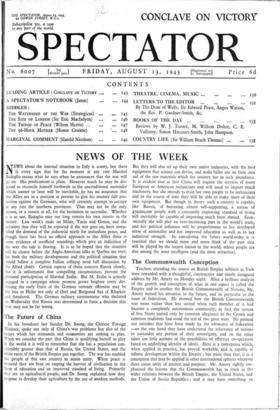The Commonwealth Conception
Teachers attending the course on British Empire subjects at York were rewarded with a thoughtful, constructive and timely inaugural address by Mr. Amery on Monday night. After a brilliant analysis of the growth and conception of what in one aspect is called the Empire and in another the British Commonwealth of Nations, Mr. Amery turned his attention to the future, and in particular to the issue of federalism. He showed how the British Commonwealth was more rather than less united when each member of it had become a completely autonomous community; in fact the system of free States united only by common allegiance to the Crown and common traditions had stood the test of two great wars. He pointed out mistakes that have been made by the advocates of federation —on the one hand they have underrated the reluctance of nations to surrender any portion of their sovereignty, and on the other taken too little account of the possibilities of effectiye co-operation based on underlying identity of ideals. Here is a conception which, when applied in practice, has proved workable, and is capable of infinite development within the Empire ; but more than that, it is a conception that may be applied in other international spheres wherever there exists unity of interest and purpose. Mr. Amery rightly em- phasised the lessons that the Commonwealth has to teach in the wider relations between the British Empire, the United States, and the Union of Soviet Republics ; and it may have something to teach in the relations between groups of States in Europe. Here is no question of the surrender of national autonomy, no irksome federalism, but unity based on what is already common to a number of free States. True, we cannot suddenly create such a Common- wealth. But among the United Nations there is already growing up just that sense of common interest which is the basic requirement. If not, there should be.























 Previous page
Previous page